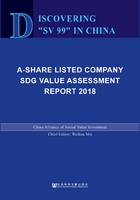
Foreword Ⅲ
We have arrived at a new milestone in the evolution of market civilisation.
Confucius’ saying “At the age of forty, I have no more doubts” also applies to China. As we leave the eventful year 2018 behind and embark on a new phase of the reform and opening-up of the Chinese economy, the second annual Discovering “SV 99” in China is being published. This report assesses the total value of CSI 300 A-share companies. Does it reveal new momentum for the Chinese economy? What kind of future does it foretell? Here are my thoughts on these questions.
Through structured measurement of the economic, social and environmental contributions created by businesses as well as exclusion of businesses which produce negative impacts, Discovering “SV 99” in China is dedicated to building a comprehensive set of tools and models for calculating and analysing SV, and developing “SV 99” ranking and rating systems. On the basis of the innovative SV proposition, the report promotes the traditional Chinese idea of DW&DG and supports the 17 SDGs outlined by the UN.
It is fair to say that this systematic report not only meets rigorous academic standards and reflects the reality of China, but also accommodates to the evaluation criteria of the international capital market.
Over the past four decades, Chinese businesses have undergone four stages of reform. The 1980s was marked by gradual commodification, marketisation, and greater autonomy for businesses. The 1990s saw the establishment of the modern enterprise system under the principle of “clear property rights, clear rights and responsibilities, separation of government from enterprises, and scientific management”. From 2000 to 2010, Chinese businesses were further integrated with the world market and continued to adapt to international rules. And since 2011, promotion of high-quality development and corporate social responsibility has been on the rise.
In 2005, the Article 5 of the revised Company Law of the People’s Republic of China clarified the legal attributes of corporate social responsibility for the first time, stating that “A company engaging in business activities must abide by the law and administrative regulations and observe social morals and business ethics. It should be honest and trustworthy and accept the supervision of the government and the public as well as assume social responsibility.”
At the 16th Asia-Pacific Economic Cooperation (APEC) informal leaders’ meeting in 2008, the then Chinese president stated that “Companies should embrace the concept of global responsibility, consciously incorporate social responsibility into their business strategies and improve their business models to achieve the unity of economic benefits and social good.”
As of 2013, all of China’s central government-owned enterprises have started to release corporate social responsibility reports.
In 2015, China’s Five-Prolonged Development Vision (CDV)-innovation, coordination, greenness, openness and sharing-for economic development was proposed at the Fifth Plenary Session of the 18th CPC Central Committee.
In 2017, the report delivered by the 19th CPC National Congress pointed out that “China’s economy has been transitioning from a phase of rapid growth to a stage of high-quality development. This is a pivotal stage for transforming our growth model, improving our economic structure, and fostering new drivers of growth. It is imperative that we develop a modernised economy. This is both an urgent requirement for getting us smoothly through this critical transition and a strategic goal for China’s development.”
In the international community, the global financial crisis that started in the USA in 2008 led to a deep reflection on the shareholder capitalism and the virtual capitalism represented by the Wall Street. Further reflections on the huge gap between capital gains and the labour gains are expressed in works such as Capital in the Twenty-First Century and Fault Lines. “A transformation from seasonal capitalism to long-term capitalism” was also called for by Dominic Barton, former CEO of McKinsey & Company and others. Taking a long-term view that focuses on balancing interests of stakeholders and establishing mission-driven long-term organisational structures have become trends. From business and finance to government and society, people have realised that commercial benefits and social welfare align in the long run. Every healthy and well-performing company has a responsibility to improve society and the environment, and this will in turn improve its competitiveness and viability. A business should solve problems for both its customers and society, instead of creating new problems.
The principle of DW&DG, or the path of sustainable development, has been promoted as a legal and social ideal both in China and the rest of the world. Nevertheless, promotion and advocacy are not enough to curb reckless and unsustainable profit-driven growth towards an unbreakable boundary.
I believe that both the media and capital markets play an instrumental role in shaping this unbreakable boundary. Unethical corporate doings can be controlled if the media exposes companies that are irresponsible to stakeholders and helps increase corporate transparency out of concern for the greater good. Capital markets can vote by feet to reward companies that are doing good and going green and punish irresponsible and unethical companies. This will shape market evaluation standards and help promote good deeds while discouraging harmful ones. This is not an easy task and will take step by step; but where there is action, there is hope.
The official launch of Discovering “SV 99” in China in 2017 was a milestone and an indicator of progress towards SV in commerce since the adoption of China’s new development philosophy.
As an ancient Chinese poetry goes, “Even in darkness, there is light; how can one not be delighted seeing a gentleman?” Discovering “SV 99” in China is a gentlemanly act that will benefit society in a profound way.

Shuo QIN
Founder, Chin@Moment
China Commercial Civilisation Research Center